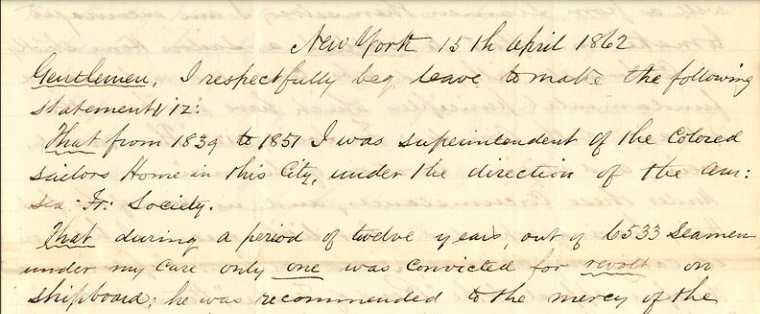The G.W. Blunt White Library manuscript collection at Mystic Seaport Museum recently offered up an exciting find in the form of reports and correspondence relating to the Colored Sailors’ Home(s) run by the American Seamen’s Friend Society in the mid-19th century. As the name suggests, these were boarding houses specifically for sailors of color; the one referenced here was located in New York City, and run by abolitionist William Peter Powell, Sr.

These letters are striking in terms of Powell’s frankness regarding the state of racism in the United States during the mid-19th century, as well as his dedication to advocating for his boarders. In one letter from April 15, 1862 (fig. 1), he writes to the Board of Trustees of the Sailors’ Home Committee to ask for financial help in securing a building to open a new Colored Sailors’ Home. He cites his success in operating one many years before, and pointedly states that he only left it to take his children to England in 1851 for their schooling, since “…owing to the prejudice against Color they could not acquire [an education] in this their native Country.” In another letter accompanying a financial report in December 1862 (fig. 2), Powell describes the harrowing circumstances encountered by Black sailors arriving in New York before they found safe quarters in the Sailors’ Home; in many other letters, he takes care to detail the sailors’ exemplary behavior despite having faced these difficulties. He seems to be working hard to demonstrate to the Board that even the “free” northern U.S. is not a welcoming place for sailors of color, and that it is worthwhile to provide safe, secure places for them to stay while on land.

These are just two letters out of 28, and the whole collection gives us the opportunity to view the Civil War era from this compelling perspective. They are especially meaningful during Black History Month and the continuing work on the “Just Futures, Reimagining New England” project, funded by the Andrew C. Mellon foundation, both of which spur us on to examine our understanding of history through the lens of racial justice.
Written By Emma Burbank, Registrarial and Research Assistant


